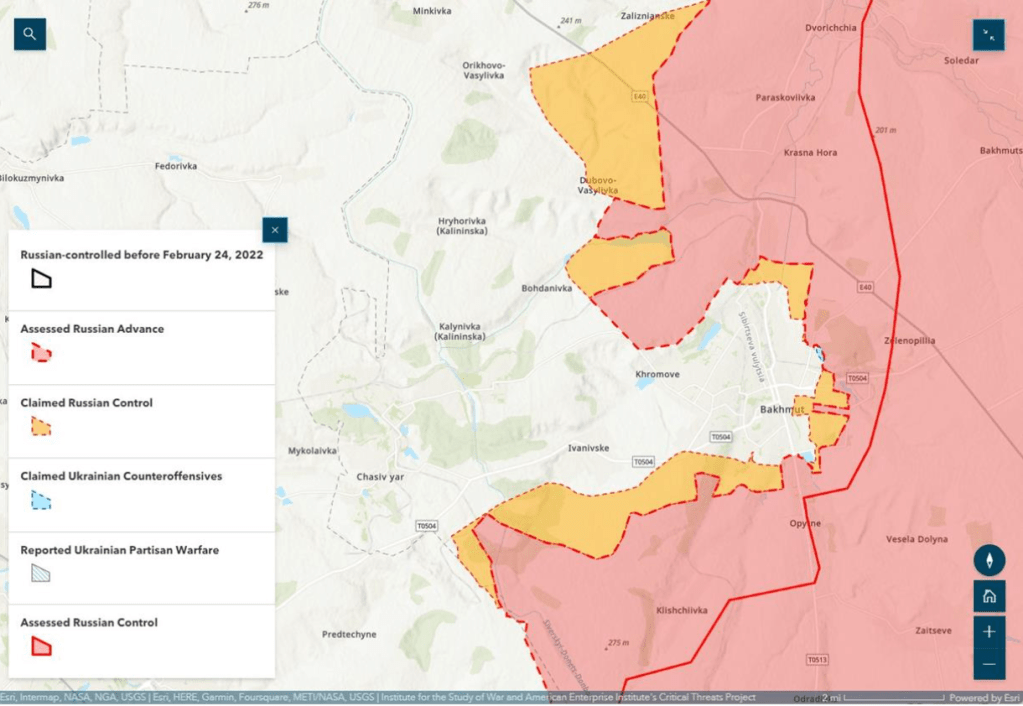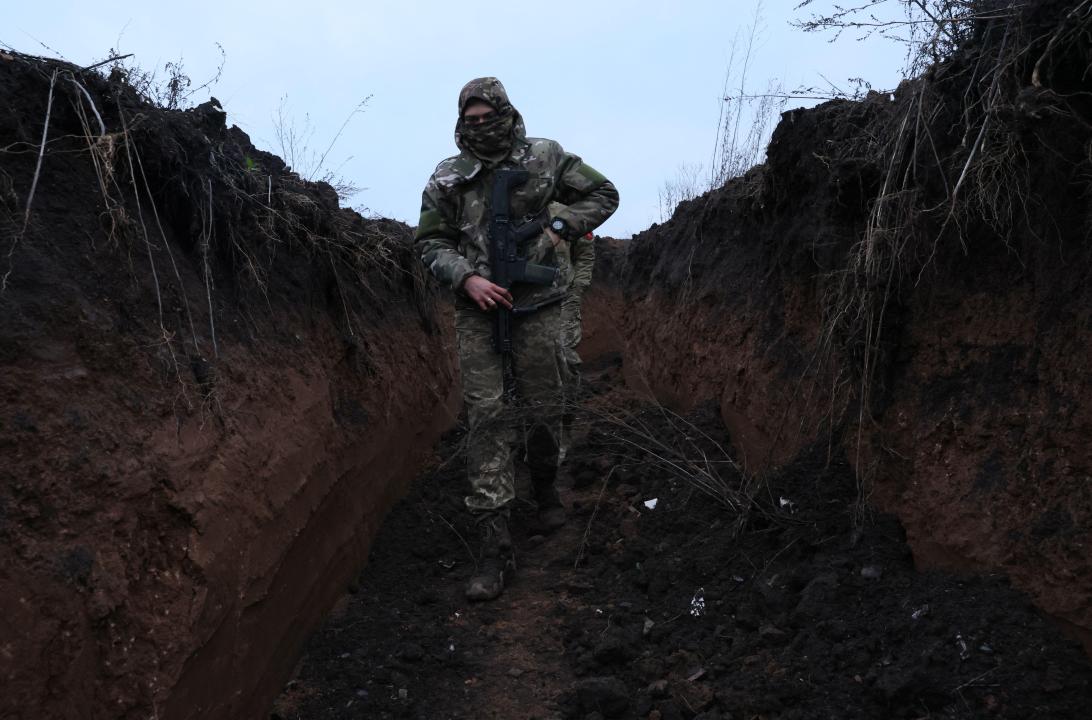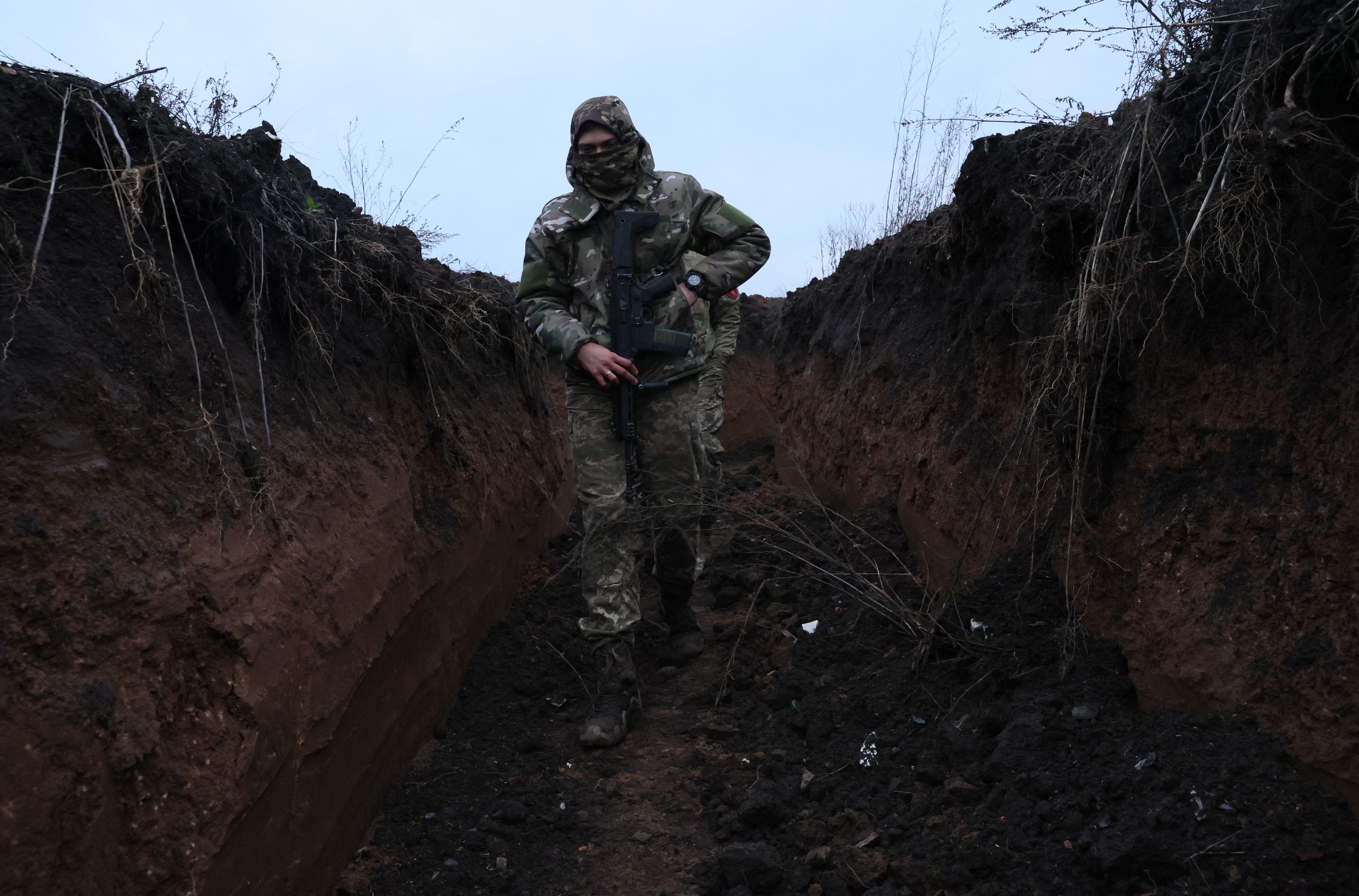‘Is Putin winning?’ asks the cover of this week’s Spectator. Until recently the overall narrative around the war focused on how much land Ukraine was liberating from Russian occupation – but the Kremlin’s strategy of throwing soldiers into the meat-grinder is paying off, with significant progress on their way to the encirclement of the city of Bakhmut.
For over six months Bakhmut has been the hottest spot on the Donbas front, with Ukrainian soldiers holding steady against the Russian regular army and Wagner Group mercenaries. But the loss of the salt town of Soledar in January and overwhelming Russian artillery and man density has allowed Russian forces to cut off two of Ukraine’s three main supply routes to Bakhmut. Now, they hold the last major road under fire control. There is every risk of Ukrainian soldiers in the city being cut off. The below map shows the state of play.

Western allies have been telling Ukraine to retreat from the city, saying it’s as good as lost and no longer worth the fight. But Ukrainian soldiers are known for their steadiness: they fought for Mariupol under siege for 82 days last year, holding a large part of the Russian troops away from other targets. In 2015 Ukrainian forces left Donetsk airport after 242 days of fierce battles, which also stopped the Russian army from advancing further. These achievements have inspired Kyiv to use the same strategy for Bakhmut today. Soldiers stay there because it stops Russians from moving on to other cities.
A week ago Oleksandr Syrsky, commander of Ukraine ground forces, visited the battlefield and ordered additional units to move to Bakhmut. Serhiy Cherevaty, the Ukrainian military spokesman, said: ‘As long as the command sees that it makes sense to keep a certain settlement, it will be fought for.’ Oleksiy Reznikov, Ukrainian defence minister, estimates the Russian army is losing 500 soldiers daily during the Bakhmut offensive. ‘They follow a crazy tactic: they send waves of Wagner fighters or former prisoners against us, to win a few metres of ground. In Bakhmut, for example, 20 of them attack our positions. After we kill them, 20 more come, and 20 more, in a continuous cycle,’ said Reznikov.
Sending reinforcements to Bakhmut might be a ruse to disorient Russians. Last year, Kyiv tricked the Kremlin by trumpeting the Kherson offensive and watching Russia move troops to protect the city – and then started the liberation of the Kharkiv region instead. Zelensky can play the same card with Bakhmut. But if the Russians manage to close the circle, then Bakhmut – and all the Ukrainian units inside it – will be under siege.
Letting soldiers stay in an encircled city has obvious implications. The retreat from Ilovaisk in 2014 through the humanitarian corridor ended up with hundreds of unarmed Ukrainian soldiers shot dead – so Kyiv should not let it happen again. And not just for humanitarian reasons: Ukraine needs to preserve combat personnel for future counter-offensives.
The fight for Bakhmut is not over yet. The UK Ministry of Defence (whose intelligence briefings are one of the most reliable sources on the war) says the winter thaw is turning ground into mud, limiting cross-country movement so it can be a ‘military advantage to defending forces’. Yesterday the Ukrainian military repelled more than 170 attacks by Russian forces in Bakhmut, Lyman, Avdiivka and other hot spots on the front line. The New York Times reported at least 130 Russian tanks and armoured personnel carriers have been destroyed by Ukrainian forces over a three-week fight for Vuhledar.
And if Bakhmut falls, Ukrainian troops who delayed the Russian advance will retreat to the next line of defence between Bakhmut and Sloviansk, which has already been dug up and prepared. While Russians will be wallowing in the mud, Ukraine’s command will receive western tanks and prepare reserves for a counterattack. Until today Kyiv has been forced to constantly redeploy forces to Bakhmut – so it may now focus on advancing from Zaporizhzhya to Melitopol, in order to cut off Russian supplies and forces in Crimea.
Bakhmut has been largely flattened, but Russia would present its fall as a victory to its citizens, many more of whom it intends to conscript. Putin needs to look stronger in the eyes of his allies, with China mulling whether to arm Russia. He also has presidential elections to consider.
But what happens in Bakhmut is of crucial importance to Zelensky too. Ukraine’s survival depends on the generosity of allies, who may waver if they see things going Putin’s way. Much is at stake. Bakhmut has already become a bombed-out ghost town: such a fate awaits other cities in Donbas unless Ukraine manages to turn this tide.
This article originally appeared in The Spectator’s Ukraine in Focus newsletter – sign up here.








Comments